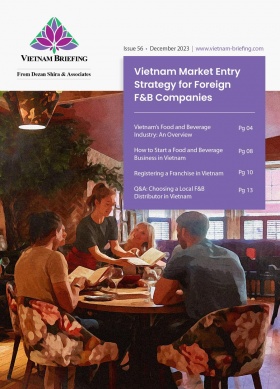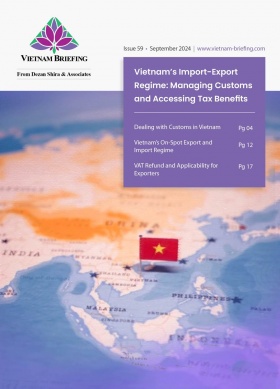Special Consumption Tax in Vietnam 2024
What is Vietnam’s special consumption tax?
Vietnam’s Special Consumption Tax (SCT), or excise tax, applies to certain luxury and non-essential goods. Commonly known as a ‘sin’ or ‘luxury’ tax, it is governed by the National Assembly’s Law on Special Consumption Tax No. 27/2008/QH12, dated November 14, 2008, which became effective on April 1, 2009.
The most recent consolidated text, 08/VBHN-VPQH, dated January 25, 2022, incorporates the original law with subsequent amendments.
Key legislative updates to the Law on Special Consumption Tax include:
- Law No. 70/2014/QH13 (November 26, 2014): Amended various SCT provisions, effective January 1, 2016.
- Law No. 71/2014/QH13 (November 26, 2014): Revised articles in multiple tax laws, effective January 1, 2015.
- Law No. 106/2016/QH13 (April 6, 2016): Updated the value-added tax, special consumption tax, and tax administration laws, effective July 1, 2016.
- Law No. 03/2022/QH15 (January 11, 2022): Amended laws related to public investment, public-private partnerships, investment, housing, bidding, electricity, enterprises, SCT, and civil judgment enforcement, effective March 1, 2022.
What is the scope of Vietnam’s special consumption tax?
Vietnam’s special consumption tax is levied on various goods, including cigarettes, tobacco products, luxury cars, and playing cards.
In June this year, the Ministry of Finance (MOF) submitted a draft law to the government proposing amendments to the SCT, specifically targeting alcohol, sugary drinks, and tobacco. The proposed amendments aim to increase duties on products deemed detrimental to public health and well-being.
Also Read: Vietnam Considers Raising Excise Tax for Alcohol, Sweetened Beverages, Tobacco
What goods are exempt from Vietnam’s Special Consumption Tax?
The following goods are exempt from SCT:
- Goods manufactured and directly exported or sold to authorized agents for export.
- Imported goods including:
a) Humanitarian aid, non-refundable aid goods;
b) Gifts for state agencies, political organizations, socio-political organizations, socio-political-professional organizations, social organizations, socio-professional organizations, people’s armed forces units, gifts for individuals in Vietnam at levels prescribed by the Government;
c) Goods that are transshipped, transited, or transported through Vietnam’s border as prescribed by the Government;
d) Goods temporarily imported for re-export, or temporarily exported for re-import during the tax-free period;
e) Personal belongings of foreign organizations and individuals under diplomatic immunity or duty-free personal belongings;
f) Carry-on baggage within duty-free baggage allowance; and
g) Goods imported for duty-free sale under the prescribed regulations.
- Aircraft, yachts used to transport goods, passengers, tourists, and aircraft used for security and defense purposes.
- Ambulances; transporting prisoners; hearses; cars designed with both seats and standing space to carry 24 people or more; cars running in amusement, entertainment, and sports areas that are not registered for circulation and do not participate in traffic.
- Goods imported from abroad into duty-free zones, goods from the domestic market sold into duty-free zones and used only in duty-free zones, and goods traded between duty-free zones, except for cars carrying people with less than 24 seats.
Calculation of the special consumption tax
The special consumption tax (SCT payable) is calculated based on the taxable price of goods or services and the applicable tax rate:
SCT payable = Taxable price × Tax rate
Taxable price
The taxable price for calculating SCT on goods and services is the selling price or service provision price, excluding SCT, environmental protection tax (EPT), and value-added tax (VAT).
Vietnam Special Consumption Tax Rates 2024
| No. | Goods or services | Rate (%) |
| Goods | ||
| 1 | Cigarettes, cigars and other tobacco preparations | 75 |
| 2 | Liquor | |
| a) Of 20° proof or higher | 65 | |
| b) Of below 20° proof | 35 | |
| 3 | Beer | 65 |
| 4 | Under-24 seat motor vehicles | |
| a) Passenger motor vehicles of 9 seats or fewer, except those specified at Points 4e, 4f and 4g of Article 7, 2008 Law on SCT (supplemented in 2014 and 2016) | ||
| Of a cylinder capacity of 1,500 cm3 or less | 35 | |
| Of a cylinder capacity of between over 1,500 cm3 and 2,000 cm3 | 40 | |
| Of a cylinder capacity of between over 2,000 cm3 and 2,500 cm3 | 50 | |
| Of a cylinder capacity of between over 2,500 cm3 and 3,000 cm3 | 60 | |
| Of a cylinder capacity of between over 3,000 cm3 and 4,000 cm3 | 90 | |
| Of a cylinder capacity of between over 4,000 cm3 and 5,000 cm3 | 110 | |
| Of a cylinder capacity of between over 5,000 cm3 and 6,000 cm3 | 130 | |
| Of a cylinder capacity of over 6,000 cm3 | 150 | |
| b) Passenger motor vehicle of between 10 seats and under 16 seats, except those specified at Points 4dd, 4e, and 4g of the tax rates prescribed in Article 7 of the 2008 Law on SCT, amended by Clause 4, Article 1 of the 2014 Law on SCT, and Clause 2, Article 2 of Law No. 106/2016/QH13 | 15 | |
| c) Passenger cars of between 16 seats and under 24 seats, except those specified at Points 4dd, 4e, and 4g of the tax rates prescribed in Article 7 of the 2008 Law on SCT, amended by Clause 4, Article 1 of the 2014 Law on SCT, and Clause 2, Article 2 of Law No. 106/2016/QH13 | 10 | |
| d) Motor vehicles for both passenger and cargo transportation, except those specified at Points 4dd, 4e, and 4g of the tax rates prescribed in Article 7 of the 2008 Law on SCT, amended by Clause 4, Article 1 of the 2014 Law on SCT, and Clause 2, Article 2 of Law No. 106/2016/QH13 | ||
| Of a cylinder capacity of 2,500 cm3 or less | 15 | |
| Of a cylinder capacity of between over 2,500 cm3 and 3,000 cm3 | 20 | |
| Of a cylinder capacity of over 3,000 cm3 | 25 | |
| dd) Motor vehicles powered by gasoline in combination with electricity or bio-fuel, with gasoline accounting for not more than 70% of the used fuel | 70% of the tax rate for cars of the same kind as specified at Points 4a, 4b, 4c, and 4d of the tax rates prescribed in Article 7 of the 2008 Law on SCT and Clause 2, Article 2 of Law No. 106/2016/QH13 | |
| e) Biofuel-powered motor vehicles | 50% of the tax rate for cars of the same kind as specified at Points 4a, 4b, 4c, and 4d in the tax rates prescribed in Article 7 of the 2008 Law on SCT and Clause 2, Article 2 of Law No. 106/2016/QH13 | |
| g) Electrically-operated motor vehicles | ||
| (1) Battery-powered electric cars | ||
| Passenger motor vehicles of 9 seats or fewer | ||
| From March 1, 2022 to February 28, 2027 | 3 | |
| From March 1, 2027 | ||
| Passenger motor vehicles of between 10 seats and under 16 seats | ||
| From March 1, 2022 to February 28, 2027 | 2 | |
| From March 1, 2027 | 7 | |
| Passenger motor vehicles of between 16 seats and under 24 seats | ||
| From March 1, 2022 to February 28, 2027 | 1 | |
| From March 1, 2027 | 4 | |
| Motor vehicles designed for both passenger and cargo transportation | ||
| From March 1, 2022 to February 28, 2027 | 2 | |
| From March 1, 2027 | 7 | |
| (2) Other electric cars | ||
| Passenger motor vehicles of 9 seats or fewer | 15 | |
| Passenger motor vehicles of between 10 seats and under 16 seats | 10 | |
| Passenger motor vehicles of between 16 seats and under 24 seats | 5 | |
| Motor vehicles designed for both passenger and cargo transportation | 10 | |
| h) Motorhomes, regardless of cylinder capacity | 75 | |
| 5 | Two- and three-wheeled motorcycles with a cylinder capacity of over 125 cm3 | 20 |
| 6 | Aircraft | 30 |
| 7 | Yachts | 30 |
| 8 | Gasoline of all kinds | |
| a) Gasoline | 10 | |
| b) E5 | 8 | |
| c) E10 | 7 | |
| 9 | Air conditioners of 90.000 BTU or less | 10 |
| 10 | Playing cards | 40 |
| 11 | Votive gilt papers and votive objects | 70 |
| Services | ||
| 1 | Dance halls | 40 |
| 2 | Massage parlors and karaoke bars | 30 |
| 3 | Casinos and prize-winning video games | 35 |
| 4 | Betting | 30 |
| 5 | Golf | 20 |
| 6 | Lottery | 15 |
SCT refund, deduction, and reduction
Tax refund
Taxpayers are entitled to a refund of paid SCT in the following cases:
- Goods temporarily imported and then re-exported;
- Imported raw materials used for the production and processing of export goods;
- Tax settlements due to mergers, consolidations, divisions, separations, dissolutions, bankruptcies, ownership transfers, enterprise conversions, or terminations of operations with excess tax paid; and
- Refunds issued by a competent authority in accordance with legal provisions or under international treaties to which Vietnam is a member.
The special consumption tax refund as prescribed in Point (a) and Point (b) shall only be applied to goods that are actually exported.
Tax deduction
Taxpayers producing goods subject to SCT using raw materials on which SCT has already been paid, and possessing the necessary documentation, are entitled to deduct the SCT paid on these raw materials when calculating the SCT payable at the production stage.
Tax reduction
Taxpayers producing goods subject to SCT and encountering difficulties due to natural disasters or unexpected accidents are entitled to tax reduction.
The tax reduction level shall be determined based on actual losses caused by natural disasters or unexpected accidents. Still, it shall not exceed 30 percent of the tax payable in the year of the damage and shall not exceed the value of damaged assets after compensation (if any).
(The original version of this article was first published October 8, 2013. It was last updated October 28, 2024.)
About Us
Vietnam Briefing is published by Asia Briefing, a subsidiary of Dezan Shira & Associates. We produce material for foreign investors throughout Asia, including ASEAN, China, and India. For editorial matters, contact us here and for a complimentary subscription to our products, please click here. For assistance with investments into Vietnam, please contact us at vietnam@dezshira.com or visit us at www.dezshira.com.
Dezan Shira & Associates assists foreign investors throughout Asia from offices across the world, including in Hanoi, Ho Chi Minh City, and Da Nang. We also maintain offices or have alliance partners assisting foreign investors in China, Hong Kong SAR, Dubai (UAE), Indonesia, Singapore, Philippines, Malaysia, Thailand, Bangladesh, Italy, Germany, the United States, and Australia.
- Previous Article E-Invoice Compliance in Vietnam: Regulations, Requirements, and Best Practices
- Next Article Tax Obligations for Resident and Non-Resident Property Owners in Vietnam































